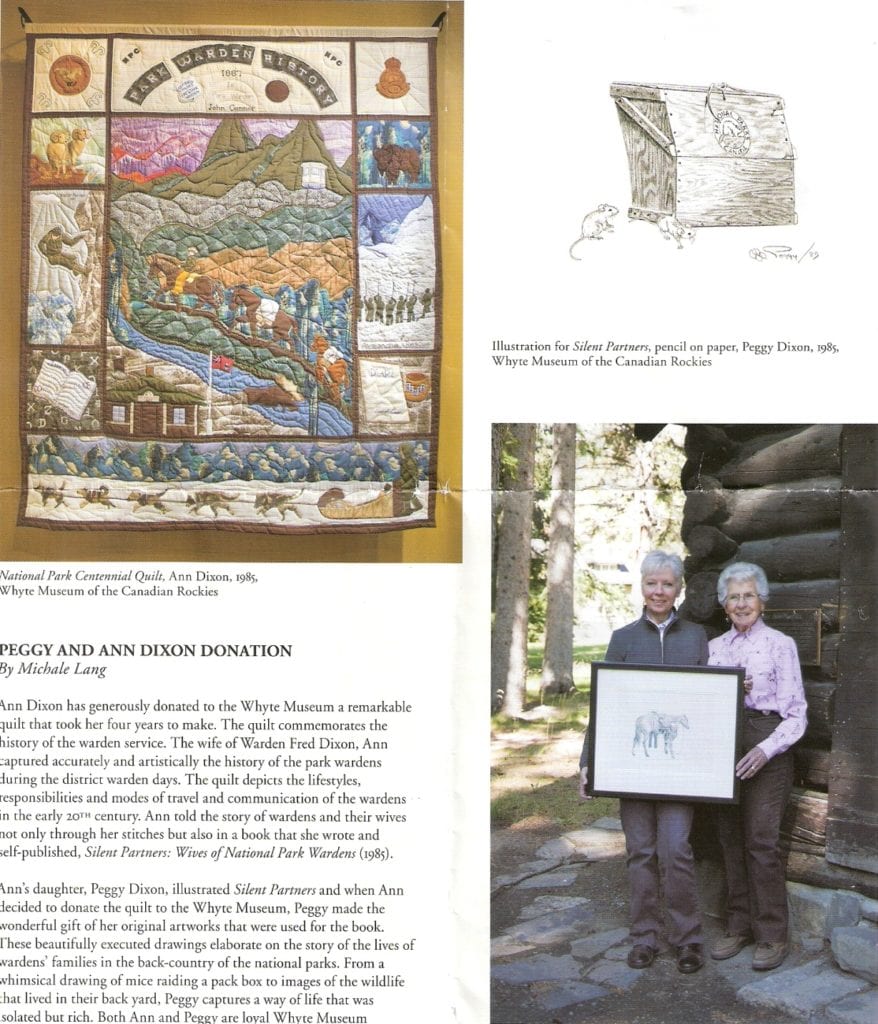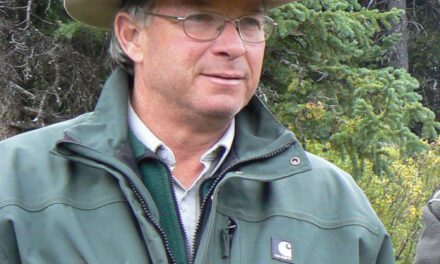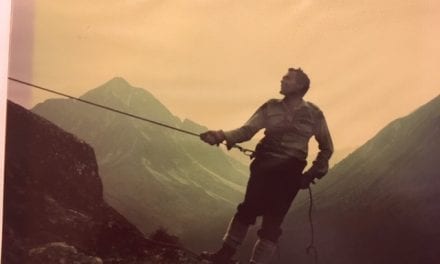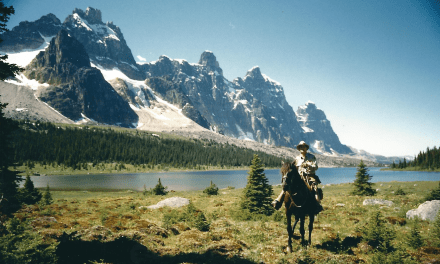(21:31) Rod – Did they come by the station occasionally?
(21:35) Ann – No, they mostly hung around where the trap was. I guess they were after something to eat.
(21:43) Peggy – Wasn’t the saddle horse that he had there a Tennessee walking horse, instead of a quarter horse. Like the park horses were different because it was different travelling…kind of boggy and bush country.
(21:59) Rod – That’s interesting.
(22:00) Peggy – Well, I got to ride him, so I remember the horse. He was a big Tennessee walking horse. But he did some team roping there.
(22:11) Ann – There is a good story I think it is in my book. One of the women from Riding Mountain tells about her husband and another warden chasing these guys across the field. They were poaching. They were caught poaching. I don’t know how it was but one of these guys, his pants fell down…He tried to run in this muskeg, there was a lot of muskeg there. They finally caught him. He just couldn’t go!
(23:01) Peggy – That’s one way to catch a poacher!
(23:05) Rod – So he got a moon shot!
(23:16) Rod – I guess being part of the warden service family was pretty important to your family.
(23:19) Ann – Yes.
(23:20) Rod – There was a lot of connections with other families that were at the various warden stations in all the different locations I am sure.
(23:30) Ann – It was just like a big family, you know.
(23:34) Peggy – To this day, I don’t know about Connie and mom, but it doesn’t matter what park it is as soon as I cross that boundary…line I feel like I have gone home and that I am safe because I know that there is going to be a warden there. No matter what happens to me, I will be taken care of.
(23:58) Rod – There is always help.
(23:59) Peggy – It is weird…as soon as you pass that slash line you are home. You are okay.
(24:06) Rod – So it has definitely been a major part of your life.
(24:08) Peggy – Oh huge.
(24:09) Rod – And your interests of course to work for the parks. Your other major accomplishment was to write the book Silent Partners. When did you actually start on that, was that when you were in Elk Island?
(24:30) Ann – No, I did the quilt when we were in Elk Island because I thought Fred was soon going to retire because he had been a warden for 27 years and I just had to hang on to something. It was such a dynamic union you know. I couldn’t bear to think of not being in the warden service anymore with Fred. So I thought, “Why don’t I start something.” I was making quilts at the time and so it turned out to be the Park Warden History Quilt, which I donated to all the wardens and the park service until the end of time. (In 2012 Ann donated her Park Warden History Quilt to the Whyte Museum of the Canadian Rockies. At the same time, her daughter Peggy donated all her original artwork form the book Silent Partners.)
Ann – Then I thought, “Well, now that quilt is for the wardens, but what about all the women?” There had to be something for the women! You never hear about them… So I did, I started the book…at the end of Silent Partners I write “Silent partners were wives of national park wardens and the park warden history wall quilt represents the dedicated undertakings of an ex-park warden, his wife and his family. It is our sincere wish that these two projects will enable us to continue to be a small part of the national park warden service for many years to come.”
(26:44) Rod – Just recently you donated your quilt and Peggy’s artwork for the writing of the book to the Whyte Museum of the Canadian Rockies in Banff.
(26:59) Ann – Yes to the archives.
(27:03) Rod – So the archives have evidence of your contributions as of 2011 that was when you donated that. That is a terrific thing that forms the basis of an archival collection…that tells part of the story at least of the wardens and their families. A terrific thing.

Excerpt from the Whyte Museum’s publication The Cairn – Winter 2012
(27:37) Rod – Is there anything particular that stands out in your mind as being exciting or memorable in the warden service? I know myself people often ask “What was your favorite location in various parks?” And what not. It is always very hard to choose, at least that is my impression because there are so many nice places in national parks and so many great memories. It is pretty hard to highlight anyone in particular.
(28:09) Ann – Yoho was a nice park to be in. It was very interesting. The lake (Lake O’Hara), the falls, Twin Falls and Takakkaw Falls, nice places. It was beautiful country.
(28:28) Rod – So it is fair to say that might have been your favorite location then, in terms of parks?
(28:34) Ann – I would say so.
(28:44) Rod – You must miss the warden life to a certain extent.
(28:46) Ann – Oh yes.
(28:47) Rod – It was such a major part of your life.
(28:50) Ann – I have more stuff, pictures, all kinds of pictures. Every time Fred went on a school. He would bring pictures back and I would put them in a book. I kept them all, I still have them. You know, and that was how many years ago?
(29:15) Peggy – Something about Yoho too was it was the first time that Connie and I got to go to school. Well, actual school. So mom got off the hook for teaching us correspondence. I was just really glad that there was the two of us because we were scared of the kids. When we went to school we stood in the school yard, you know for recess the other kids were playing and swinging and doing stuff, and we just stood in the corner together and just watched them. Like you would watch a wild animal I guess, because we were just afraid of the kids.
(30:09) Rod – That is certainly interesting. Connie was mentioning that as well, two dramatically different forms of childhood there. You moved from the bush environment and your immediate family into a town site location with other children and other families and people around all the time. That must have been quite a switch, eh.
(30:32) Connie – Yeah, we didn’t know how to play with kids at all. Not at all. So we gravitated towards the teachers which then caused an issue because then the kids didn’t want anything to do with us because they called us teachers pets. But we didn’t know how to play with kids, we had no idea. But we knew how to talk to an adult.
(30:51) Rod – And even relate to animals and what not.
(30:53) Connie – Oh definitively.
(30:55) Rod – And the trails and the countryside around.
(30:58) Connie – That never leaves you either.
(31:02) Ann – You played the drums in the band.
(30:05) Connie – Yeah, we had a school band.
(31:07) Ann – Well what did Peggy do?
(31:09) Connie – She played drums, remember she poked a hole in your chair seat playing the drums. “Don’t play on the seat of the chairs.” She did anyway. Bang, in went the hole!
(31:22) Rod – So after you left Riding Mountain, you moved to Elk Island National Park.
(31:29) Ann – Yes.
(31:31) Rod – And spent several years there before Fred retired.
(31:37) Ann – Right. It must have been five or six years I guess…
(31:44) Rod – That is where we met and I was fortunate enough to live and eat at your place half the time! I was a young naïve fellow in those days, but Fred sure taught me an awful lot about everything, including life. It was a great experience to get to know your family and work with Fred.
(32:10) Peggy – And ride Ike.
(32:11) Rod – Yeah, that’s right! The horse that Fred picked out for me and was gracious enough to let me ride him. That brings up a bit of a story. It is one of those park things that used to happen when you moved from one park to another. Often times you could take your favorite saddle horse or what not. That has long since been discontinued unfortunately. But I had a horse there that Fred taught (me to ride), a young horse that I really liked. When he asked for me if he could move it to Jasper so that I could continue to use the horse, the Park didn’t think that was a necessary thing to do. Of course they had lots of horses in Jasper. It was one of those petty little park things that is kind of an unfortunate tradition…It was always kind of nice especially if you trained or worked with a horse any amount of time, it was pretty nice to move it from one park to another if you were using horses.
(33:21) Peggy – There was a black mare there too, her name was Ivy. Ike and Ivy were born the same year. They were really close, weren’t they Rod? I don’t know if you were still there or not when Ivy got lame. She slipped on the ice or something. She went lame and they had to put her down. I think Ike absolutely died of loneliness. He just pined for her. He was quite a horse.
(33:54) Rod – Well those were great memories.
(33:56) Peggy – That was where the buffalo gored my dad.
(33:59) Rod – Yes, we should mention that. That was a pretty scary event. I wasn’t working the day that happened, but you probably recall that happening in a squeeze down at the abattoir when Fred was handling some bison.



